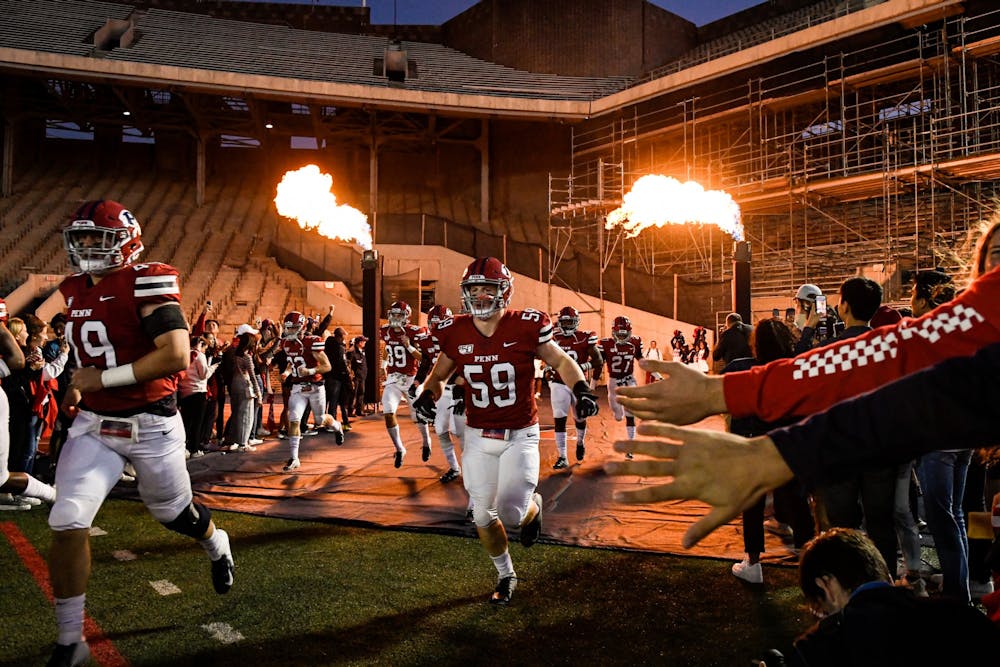
For generations, fall has been synonymous with football. For over a century, the changing of leaves has coincided with the cracking of pads. This year, however, one of America's favorite pastimes is in serious jeopardy.
Penn football had barely begun spring training when the news hit that the university would no longer have in-person classes.
The Quakers finished the fall season with a 5-5 record, 3-4 Ivy, suffering a season-ending loss to arch-rival Princeton. Going into winter and spring ball, the Red and Blue were looking to improve for the coming fall, adjusting to the departure of graduating seniors Greg Begnoche, Prince Emili, and Zach Evans, all of whom received All-Ivy recognition. Then training was cut short in sudden fashion.
Though the Quakers were able to complete the entirety of their winter training, they only made it through one of their 12 total spring practice dates before spring break. In-person classes at Penn were canceled for the remainder of the semester, followed promptly by the suspension of all college athletics. Instead of having their annual Spring Game on April 11, the team found itself scattered across the country.
Rising senior linebacker Brian O’Neill was one of two non-senior Quakers to receive All-Ivy honors for his performance in the fall, earning second team All-Ivy recognition along with rising junior wide receiver Ryan Cragun. Instead of training at Penn in the spring, O’Neill was forced to adjust to staying active at home.
“We have guys all over the place, all different time-zones, like in California, Texas, and the Northeast,” O’Neill said.
In order to keep connected during the spring, the team held player-led Zoom sessions which helped each member check in with each other, even while physically separated. Without the presence of coaches, players would support and drive one another during workouts, converse, and otherwise keep in touch and help each other stay motivated.
The athletes’ workout capabilities depend heavily on what each member has at home. Without Penn's facilities and with most gym facilities closed due to COVID-19, O’Neill bought dumbbells and manufactured weights in order to do workouts at home while also going on runs around the neighborhood. While some areas of the U.S. have lessened regulations, O’Neill lives in the Northeast, where rules are still more stringent.
Still, resource limitations are only one small part of the adjustment necessary. While being on campus allows for a focus on purely school work and athletics, being at home poses other challenges.
“You have stuff to do at home too,” O’Neill said. “We had to worry about classes in the spring. It’s hard to find time for everything when I also need to mow the lawn or take the dog out.”
With the fate of the season in limbo, summer plans have also dramatically shifted. This year’s incoming freshman class has already been established, with the Quakers welcoming 31 newcomers from 16 different states. However, the peak of recruiting for future freshmen would have occurred throughout late spring to early summer, leading to the replacement of in-person visits with video or phone calls.
Training plans for each of the players have also been complicated due to the closing of Penn’s campus. With the elimination of in-person summer classes, players can’t work out together on campus as they ordinarily might, largely continuing with the systems they had in place during the spring.
“Normally, I would be on campus right now with some of the guys, doing workouts and training together,” O’Neill said. “That’s not possible anymore.”
The state of Penn in the fall — whether or not there will be in-person classes, athletics, or on-campus life — is still unknown. Similarly, the Ivy League and NCAA have yet to announce any plans regarding fall sports and football.
“I think that the best-case scenario right now is obviously just the season going normally as planned,” O’Neill said. “Personally, whether or not fans are there doesn’t bother me as much. I just want to play, and I know a lot of the guys are the same. We just want to have the chance to play again.”
As for the worst-case scenario, O’Neill hopes that at most, the season continues in any form it can, likely without fans, but gets delayed or shortened rather than canceled in its entirety.
“You have to stay positive and hope for the best,” O’Neill said.
The Daily Pennsylvanian is an independent, student-run newspaper. Please consider making a donation to support the coverage that shapes the University. Your generosity ensures a future of strong journalism at Penn.
Donate






